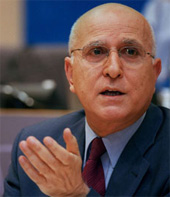 According to the Today Programme on BBC Radio 4 this morning Stavros Dimas is the “EU’s Environment Chief“. Well, sort of. He’s actually European Commissioner for the Environment. Now would the same programme dream of calling John Hutton “Britain’s Industry Chief” or Hillary Benn “Britain’s Environment Chief“. No, of course not – they would be referred to by their correct government minister titles.
According to the Today Programme on BBC Radio 4 this morning Stavros Dimas is the “EU’s Environment Chief“. Well, sort of. He’s actually European Commissioner for the Environment. Now would the same programme dream of calling John Hutton “Britain’s Industry Chief” or Hillary Benn “Britain’s Environment Chief“. No, of course not – they would be referred to by their correct government minister titles.
There are other examples – calling MEPs “Euro MPs” – which is ambiguous as it can imply these are Members of Parliament in Westminster who care about Europe. Discussion about Blair and whether he wants the job as President of the European Council is referred to as “the first standing President of the EU“. The Convention on the Future of Europe was often said to be drawing up a “charter” for Europe, rather than a constitution or a treaty – both of which would be more correct terms.
Of course it’s possible to see what’s going on here – an effort to make European politics understandable to the masses. I do wonder however whether some of the terms give the wrong impression. Of course there is a problem on the EU side too – why are Commissioners called Commissioners, rather than Ministers? Why not call the Council of the EU the European Senate instead? Maybe terms like “EU’s Environment Chief” sound less scary?








On the MEP Euro-MP dichotomy. Whilst of course MEP is correct, andf I note that some call themselves Euro deputies, I find myself using the inacccurate Euro-MP moniker in press releases. Why?
Because, particularly with regional and local press the term MEP is generally meaningless, and the editors prefer something that they themselves can get a handle on. I have spoken to a number of them and they prefer the term. They believe it is more comprehensible to their audience.
Sometimes you just have to go with the flow.
Jon,
Your questions are interesting. A few comments off the cuff:
The European Community (Union) seems to use the same manner to ‘localise’ certain terms, at least in some instances.
Without bothering to check, my impression is that the European Parliament (press office) uses names for the committees that follow the domestic pattern, in other words fairly loosely translated.
The European level parties seem to be tempted to do likewise. At least in Sweden, the PES group is seldom called socialist, but normally social democratic.
(I wonder if ‘socialist’ makes the good Swedes think of French luddites clashing with the police and doing everything in the book to fail at globalisation?)
Then we have a different question about ‘ministers’ and ‘Senate’.
The Commission is called Commission, because the member states have not been ready to institute a union based on its citizens, but rather an intergovernmental organisation with supranational traits and incipient democracy.
When the European Union gets a politically accountable executive, in charge of all EU policies, the members should be called ministers (and will be, I presume).
The member states, holding on to their prerogatives (foreign, security and defence policies as well as all the special legislative procedures) have not accepted the idea of a European Parliament with two chambers, with the second house or Senate repesenting the states.
By the way, it took a long time before the US Senate evolved into a popularly elected body.
Calling the coming president of the European Council the first standing president of Europe or the EU is in my view sloppy.
As you have pointed out, there have been Commission presidents since Walter Hallstein. Time enough to notice, even in Britain, one would think, especially when we speak of some of the most respected media companies in the world committing these elementary errors.
I wish you nice Easter Holidays.